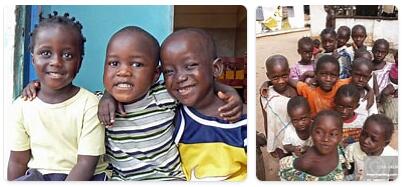Yearbook 2016
The Gambia. In April, a dozen members of the United Democratic Party’s (UDP) youth federation held a peaceful demonstration in the capital Banjul demanding political reform and President Yahya Jammeh’s departure. The demonstration was interrupted by violence by police and security services and the protesters were abducted. According to information that emerged at a later date, Solo Sandeng, one of the leading UDP politicians, died in the detention, which was later confirmed by the authorities, although they did not disclose the cause. The death led to new protests, but again this time the protesters were arrested, among whom were UDP leader Ousainou Darboe. He and 35 other people were indicted later in April for riots and illegal protests. Later, the prosecution was expanded with the charge “conspiracy to commit crime”.
In May, more arrests followed when UDP supporters protested against the trials. In the same month, Amnesty International criticized the regime’s actions and urged the West African cooperation organization ECOWAS to exclude Gambia unless a larger number of political prisoners were released. In June, Darboe and 17 others were sentenced to three years in prison each for organizing an illegal demonstration. However, the point of indictment on incitement to violence was rejected. The following month, another eleven UDP supporters were sentenced to prison terms.

The current population of Gambia is 2,416,679. The demonstrations and harsh reactions by the regime could be partly explained by the upcoming presidential election, which was scheduled to be held in December. In May, a new political party, the Gambia Democratic Congress (GDC), was founded by people who dropped out of the ruling party Alliance for Patriotic Reorientation and Reconstruction (APRC). One of the GDC’s representatives, Tina Faal, was arrested both in July and August, accused of, among other things, embezzlement. She was released to the castle both times. Another woman, Isatou Touray, who made herself known for her work on genital mutilation (female circumcision), announced in September that she intended to run for office in the presidential election. She would thus become the country’s first female presidential candidate. In October, however, the various opposition parties decided that they would launch a joint candidate.
Yahya Jammeh was running for December for another term as president but surprisingly lost to Barrow. The President announced that he would accept the election and would work for a smooth change of power. However, he changed after the votes were recalculated in one region. However, the adjusted results still showed that Barrow had won, albeit by a smaller margin: 43 percent of the vote against 39 percent for Jammeh. Despite regional and international pressure, Jammeh seemed to have decided to remain even after January 18, 2017, when Barrow would formally take over the presidential post.
A truck block on the border with Senegal, which started in February, caused a shortage of goods in the Gambia. According to thereligionfaqs, the reason why truck drivers decided to block the border crossing with their trucks was Gambia’s decision to double the fees for trucks crossing the border. Only in May was the blockade broken after negotiations between the governments of the countries.
The compulsion for women in public service to wear a veil that was introduced on December 31, 2015 and came as a result of President Jammeh proclaiming Gambia as an Islamic state was lifted already in January. In July, the president ordered Parliament to ban girls under 18 from getting married. Men who enter into marriage with minors and parents who give consent to child marriage must be sentenced to imprisonment for up to 21 years under the new law.